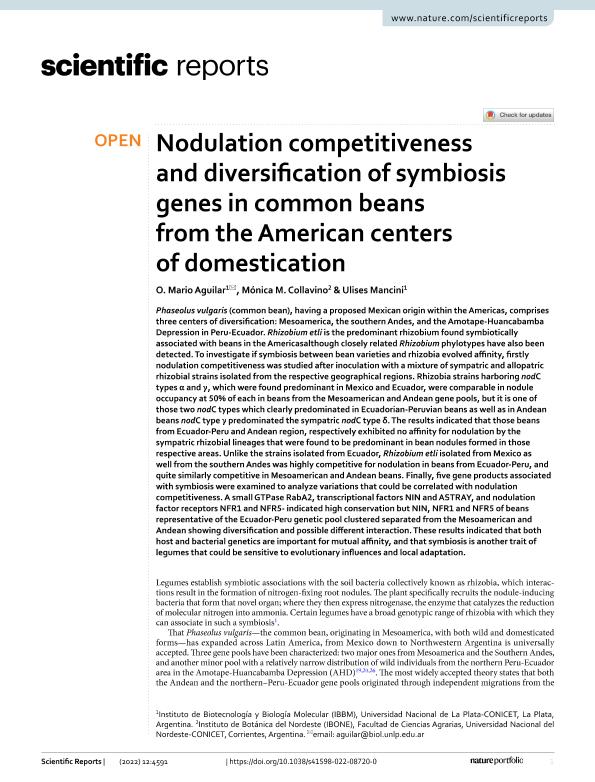Artículo
Nodulation competitiveness and diversification of symbiosis genes in common beans from the American centers of domestication
Fecha de publicación:
03/2022
Editorial:
Springer Nature
Revista:
Scientific Reports
e-ISSN:
2045-2322
Idioma:
Inglés
Tipo de recurso:
Artículo publicado
Clasificación temática:
Resumen
Phaseolus vulgaris (common bean), having a proposed Mexican origin within the Americas, comprises three centers of diversification: Mesoamerica, the southern Andes, and the Amotape-Huancabamba Depression in Peru-Ecuador. Rhizobium etli is the predominant rhizobium found symbiotically associated with beans in the Americasalthough closely related Rhizobium phylotypes have also been detected. To investigate if symbiosis between bean varieties and rhizobia evolved affinity, firstly nodulation competitiveness was studied after inoculation with a mixture of sympatric and allopatric rhizobial strains isolated from the respective geographical regions. Rhizobia strains harboring nodC types α and γ , which were found predominant in Mexico and Ecuador, were comparable in nodule occupancy at 50% of each in beans from the Mesoamerican and Andean gene pools, but it is one of those two nodC types which clearly predominated in Ecuadorian-Peruvian beans as well as in Andean beans nodC type γ predominated the sympatric nodC type δ. The results indicated that those beans from Ecuador-Peru and Andean region, respectively exhibited no affinity for nodulation by the sympatric rhizobial lineages that were found to be predominant in bean nodules formed in those respective areas. Unlike the strains isolated from Ecuador, Rhizobium etli isolated from Mexico as well from the southern Andes was highly competitive for nodulation in beans from Ecuador-Peru, and quite similarly competitive in Mesoamerican and Andean beans. Finally, five gene products associated with symbiosis were examined to analyze variations that could be correlated with nodulation competitiveness. A small GTPase RabA2, transcriptional factors NIN and ASTRAY, and nodulation factor receptors NFR1 and NFR5- indicated high conservation but NIN, NFR1 and NFR5 of beans representative of the Ecuador-Peru genetic pool clustered separated from the Mesoamerican and Andean showing diversification and possible different interaction. These results indicated that both host and bacterial genetics are important for mutual affinity, and that symbiosis is another trait of legumes that could be sensitive to evolutionary influences and local adaptation.
Palabras clave:
Phaseolus vulgaris (frijol)
,
Rhizobium
,
Nodulation
,
NFRs genes
Archivos asociados
Licencia
Identificadores
Colecciones
Articulos(IBBM)
Articulos de INST.DE BIOTECNOLOGIA Y BIOLOGIA MOLECULAR
Articulos de INST.DE BIOTECNOLOGIA Y BIOLOGIA MOLECULAR
Articulos(IBONE)
Articulos de INST.DE BOTANICA DEL NORDESTE (I)
Articulos de INST.DE BOTANICA DEL NORDESTE (I)
Citación
Aguilar, Orlando Mario; Collavino, Mónica Mariana; Mancini Villagra, Ulises Maximiliano; Nodulation competitiveness and diversification of symbiosis genes in common beans from the American centers of domestication; Springer Nature; Scientific Reports; 12; 1; 3-2022; 1-9
Compartir
Altmétricas




